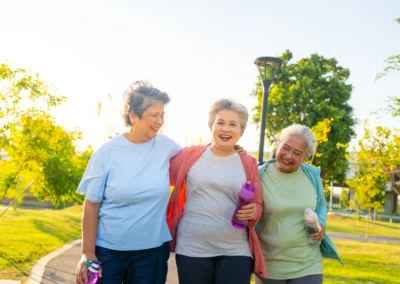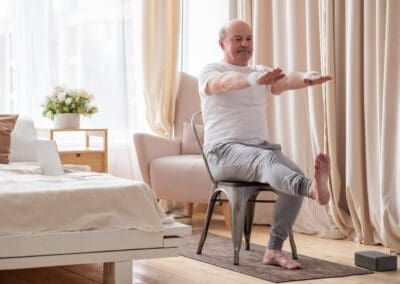This pandemic year has been challenging to put it mildly. Older adults in particular have been at increased risk for severe infection. Yet studies have shown that older adults have managed to stay relatively happy during the pandemic. Compared to younger adults, the older generation experienced more positive emotions in a given day and fewer negative ones, regardless of income or education. What these studies suggest is that older adults possess emotional wellness.
What Is Emotional Wellness?
Emotional wellness for seniors is the ability to successfully handle life’s stresses and adapt to change and difficult times. It’s a state of mind that’s calm, relaxed, open, present, reflective, creative and wise. Psychologists describe emotional wellness as “the combination of feeling good and functioning effectively.”
The Benefits of Emotional Wellness for Seniors
Taking steps to improve your emotional wellness can make you feel more relaxed, present and wise. It can improve your relationships with others and make you feel physically and emotionally better. It can help you be more resilient and cope with loss. It may even help you live a longer life.
To learn how to strengthen your emotional wellness, follow these tips for a happier, healthier you.
6 Strategies for Improving Your Emotional Health
- Brighten your outlook. People who are emotionally well have fewer negative emotions and are able to bounce back from difficulties faster. Another sign of emotional wellness for seniors is being able to hold onto positive emotions longer and appreciate the good times. To develop a more positive mindset, give yourself credit for the good things you do for others. Forgive yourself when you make mistakes. Don’t dwell on them, learn from what went wrong. Surround yourself with positive people. And think about how to guide your life by the principles that are important to you.
- Stay active. Exercise can help manage stress, anxiety and depression. As an added bonus, whenever you exercise, you’re rewarded with a quick mood boost. Exercise regularly and you’ll gain self-confidence, improve brain function and help prevent memory loss. The more you can incorporate aerobic and muscle-strengthening exercises into your weekly routine, the better you’re likely to feel both physically and mentally.
- Strengthen connections. Older adults are at increased risk for loneliness and social isolation — risks that can be as damaging to health as smoking 15 cigarettes a day. To strengthen your social connections, nourish them. Build strong relationships with family and friends. Join a group focused on a favorite hobby. Take a class to learn something new. Volunteer for things you care about in your community.
- Sleep well. Make getting enough sleep a priority. Most adults need eight hours of sleep a day to function at their best. A good night’s sleep helps you think more clearly and focus better. Lack of sleep, on the other hand, can turn you into a grouch. Maintain a regular sleep schedule, exercise daily, and limit the use of electronics before bedtime. If stress is keeping you up at night, find someone you can talk to during the day to sort out what’s troubling you.
- Keep a diary. This can help you keep track of your emotions and how you relate to others. You may want to keep a gratitude journal by writing down all the things you’re thankful for every day. Taking a few minutes to write down all the good things that could happen to you in the future is another way to foster a positive outlook — especially if you put a plan in place to work toward a better future.
- Be mindful. Mindfulness is about being completely aware of what’s happening in the present. It means not living your life on autopilot. To be more mindful, simply take some deep breaths. Breathe in through your nose, hold it for a second, then exhale slowly through your mouth. When you’re out for a walk, notice your breath and the sights and sounds around you. As thoughts and worries enter your mind, note them but then return to the present. Yoga and meditation classes can also help you be more mindful. Popular apps such as Headspace, Ten Percent Happier and Calm, are available online.
The Way to Wellness at Sedgebrook
At Sedgebrook, we take a holistic approach to wellness with programs, classes, and activities designed to engage mind, body and spirit. To learn more about our multidimensional approach to wellness, and how it helps residents enjoy healthier lives, get in touch.



